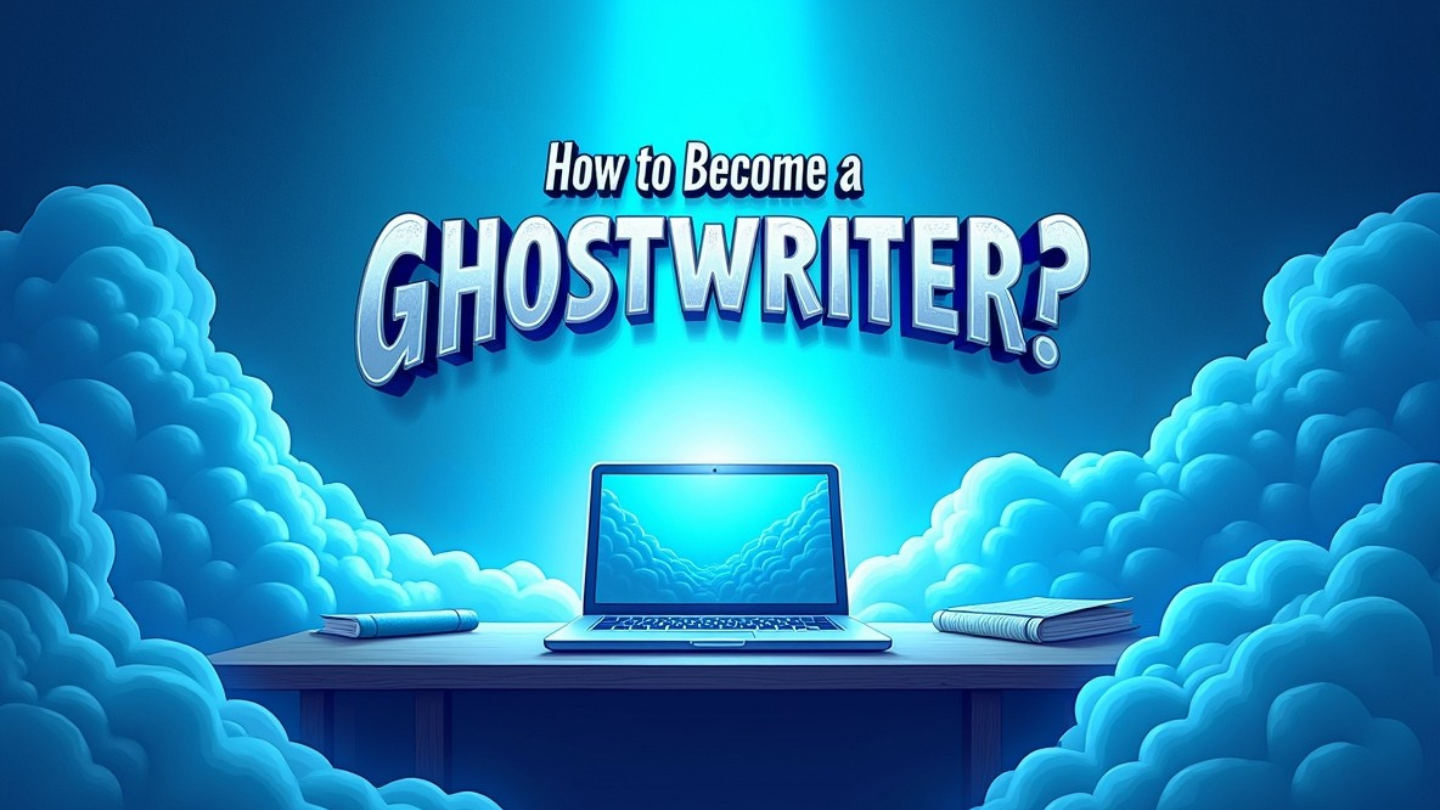Ghostwriting emerges as one of the most subtle yet powerful crafts in the literary world. In many bestselling books, popular blog posts, and even best-selling speeches, ghostwriters are the ones behind that, played an integral part in writing.
It isn’t a field most writers enter right away, it’s something you grow into. For anyone wondering how to become a ghostwriter, this profession empowers writers to assist countless individuals in transforming their ideas into words, often without public recognition.
Whether your aspirations lie in writing memoirs, corporate materials, or online content, with the help of this guide, you will be able to undergo the transformation from a novice to a professional.
What is Ghostwriting?
Ghostwriting refers to the practice of creating texts. Ghostwriting suggests that someone else is taking credit for work they did not do. Ghostwriting includes the preparation of all content forms, from blogs to speeches to fiction and non-fiction books to personal diaries, as well as web content ‘silenced’ in the public domain. A ghostwriter is a more skilled professional specializing in creating works that are not acknowledged as their work.
In professional ghostwriting, the credit of a work often remains with someone else. A ghostwriter gets little or no credit for what he or she creates. Credits aside, the work gets done through the efforts of the ghostwriter. In creating a particular work, the ghostwriter often decides on the voice, the style, and the message meant to be relayed in the work. Shaping the tone of the manuscript or putting the ideas of the speaker into words is just but a sliver of what ghostwriting entails.
Knowing how to become a ghostwriter, begins with understanding what ghostwriting is and what it involves. It is not enough to accomplish tasks with exemplary writing skills. There is a lot of capturing other people’s essence in writing. In order to achieve this, putting oneself in a client’s shoes fully requires immersing oneself in their intended voice, vision, and all intents. That requires collaboration with varying stakeholders through interviewing for research purposes or complex subjects completely alien to them, which pulls them together. It is a blend of adaptability, empathy, and good storytelling.
Why the Demand for Ghostwriters Is Growing?
The rise of digital media and self-publishing has led to an increased demand for content. In recent years, ghostwriting has emerged as one of the leading niches of the writing industry, and with good reason.
It is no longer the case that authors are the only individuals in pursuit of visibility; ghostwriters are taking the front seat. Behind the scenes, they work with busy professionals, coaches, and entrepreneurs who need done-for-you content.
Many of these professionals seek out ghostwriters due to the ever-increasing need for content marketing and personal branding, indicating that ghost writer career is in higher demand now than ever before and predicted to be in even greater demand in 2025.
Take a look at the following reasons to understand what ghostwriting is and why ghostwriting is in high demand:
1. The Emergence of Content Marketing and SEO
Every business wants to sell more than its competitors, so placing itself at the top of the competition is now a goal everywhere. And as we know, content contains a lot of information that can be used to market a company’s goods. Blogs, newsletters, case studies, and even eBooks are mandatory for branding. So is it true that all the marketing managers or even CEOs have the time to write all of it? Absolutely not.
That’s where junior and seasoned ghostwriters come in. Businesses hire ghostwriters to create SEO-friendly content that is capable of pulling increased attention to the business and its services.
Are you starting out on how to become a ghostwriter? Having a brand’s voice and understanding SEO makes you an industry commodity.
2. Personal Branding Is Soaring
Building personal brands as industry leaders is an upside some professionals consider these days, but not many know about them as speakers or even influencers. LinkedIn educators, YouTube influencers, and even podcast hosts want to appear visually appealing but also coherent across all platforms.
That implies they will need:
- Articles for LinkedIn
- Books outlining their core concepts
- Newsletters
- Blog posts
Yet, the vast majority lack the time or expertise to write everything themselves. This is precisely where ghostwriting services come in, providing content that is guaranteed to make an impact without extraneous effort on the client’s part.
3. The Rise of Self-Publishing
Once upon a time, if someone wanted to publish a book, they needed to go through a long-winded selection process with agents and publishers.
Countless entrepreneurs, consultants, and executives are looking to publish a book that establishes them as thought leaders or share their inspiring personal experiences to enhance their credibility. Many of these clients will have their stories written for them by ghostwriters who create them from interviews, notes, and outlines.
This spike in demand has led to a plethora of ghostwriter gigs for novices willing to write chapter drafts, polish drafts, or collaborate on full manuscripts.
If you have ever wanted to find out how to become a ghostwriter for books, this one is a great starting, especially in emerging nonfiction categories like business, health, and spirituality.
4. Time Saving Solution
From high-profile public figures to local business owners, even well-known professionals understand that they need content but don’t want to deal with the nitty-gritty of creating it.
Employing the services of a ghostwriter provides them with:
- An appealing, professional voice
- A quick turnaround
- Content that is refined
- Comprehensive support
As a consequence, ghostwriting is not simply writing. It often entails ideation, outlining, interviewing, and strategizing editorial processes. The more services you provide, the greater the fees you can command.
For those pursuing a career as long-term ghostwriters, mastering the skills of project management, conducting interviews, and editing is equally important as the writing itself.
5. AI Tools Have Increased Demand, Not Reduced It
In fact, the opposite of popular perception is true: AI writing tools have not displaced ghostwriters, they have provided greater opportunities. Why is that?
Since AI can generate text but not voice, empathy, or nuanced storytelling that clients greatly appreciate from a ghostwriter, ample opportunities are available.
In fact, many business owners who tried AI content are looking for real writers to effectively refine, personalize, or rewrite that content. This creates opportunities for new ghostwriters who can edit and add a human touch to AI drafts.
If you’re attempting to go into ghostwriting with no prior experience, offering AI editing services or ‘humanization packages’ can be a good starting point. Now, it’s easier to understand how to become a ghostwriter and connect with the right resources at the right time.
Understand the Basics of Types of Ghostwriters: Types of Ghostwriters
Each category has different skills, and understanding the types of ghostwriters is important. These different categories of ghostwriters provide diverse career pathways, each with its own learning resources, skill prerequisites, and earning potential. Focusing on a specific niche early allows one to create a portfolio that targets lucrative clients.
Every ghostwriter has a unique career path, as there is no general approach to ghostwriting. Below are the different career paths and different styles of writing and clients for each.
1. Book Ghostwriters
These are the writers for the autobiographies, memoirs, novels, or non-fiction books of their clients. Usually, these are long-term undertakings that pay well.
2. Business Ghostwriters
Thought leadership articles, case studies, and virtually any corporate or corporate-related content fall into this category.
3. Blog and Article Ghostwriters
They assist companies and individuals in enhancing their online presence by creating blogs for websites and businesses.
4. Script and Screenplay Ghostwriters
Together with screenplays, they also write behind-the-scenes scripts for YouTube or video creators, marketers, and media producers.
5. Social Media Ghostwriters
They handle the brand personal accounts of CEOs, influencers, and politicians on social media like LinkedIn, Twitter, and Instagram.
6. Speechwriter
They prepare important speeches and talking points for politicians and other public figures.
Ghostwriter vs. Author: What Sets Them Apart
Grasping the distinction between a ghostwriter and an author is fundamental both when considering a career as a ghostwriter and when thinking of hiring one. Each of the two roles strikingly differs in their achievement, acknowledgment, and processes despite the fact that both deal with written works.
If you have been asking yourself, “how to become a ghostwriter”, understanding this difference will help you manage your expectations. Unlike traditional authorship, self-expression dominates most writing endeavors, while ghostwriting could be considered more of a service.
In addition, ghostwriting is the quickest avenue for gaining income through writing, especially for those looking for beginner ghostwriter jobs or seeking a way to become a ghostwriter with no experience.
|
Aspect |
Ghostwriter |
Author |
| Credit | Behind-the-scenes, anonymous | Publicly credited |
| Creative Control | Works within the client’s vision | Full control over content |
| Income | Paid fees upfront | Royalties, advances, book sales |

Step-by-Step Guide: Launching Your Ghostwriting Career in 2025
In order to be successful as a ghostwriter, you not only need skills and talent but also a marketing strategy aimed at acquiring clients and increasing your credibility and income. With no prior experience, these ghostwriting step-by-step guide will enable you to achieve ghostwriting success.
Step 1: Choose Your Niche and Format
It’s essential to determine the niche and content focus area of your interest before advertising your ghostwriting services. Narrowing this scope increases client appeal while enabling aggressive self-marketing.
What is a ghostwriting niche?
It’s the specific industry or content style you focus on. By narrowing your niche, you demonstrate a deep understanding related to how to become a ghostwriter and can charge premium ghostwriting rates.
Popular Ghostwriting Niches in 2025:
- Health & Wellness: Blog posts, self-help books, or digital courses for coaches and fitness experts
- Real Estate: eBooks, LinkedIn articles, and lead magnets for agents and brokers
- Tech & SaaS: Whitepapers, case studies, and content marketing blogs
- Memoirs: Life stories for entrepreneurs, public figures, or ordinary people with extraordinary journeys
- Thought Leadership: LinkedIn ghostwriting for consultants and executives
Choose Your Format:
- Blog posts
- Business books
- How-to guides
- LinkedIn thought pieces
- Email newsletters
- Website copy
- Case studies
- Ghostwritten speeches
Pro tip: Specializing in both a niche and a format positions you as an expert. For instance, declaring, “I’m a ghostwriter for wellness brands who need email funnels and eBooks” communicates your message more precisely than “I’m a freelance writer,” which is more generic. The former is more effective by at least tenfold.
Step 2: Build a Ghostwriting Portfolio
Even if you have no prior experience as a paid ghostwriter, you can still learn how to become a ghostwriter and create a ghostwriting portfolio that looks professional and showcases your abilities.
What to Include in a Beginner’s Portfolio?
- A corporate blog post: Write an informative article in a formal tone as if for a company’s blog. Choose a business-related topic relevant to your niche.
- A sample book chapter: Draft the introduction to a memoir or how-to guide, showcasing your ability to structure ideas and convey voice.
- A ghostwritten LinkedIn post or article: Mimic the tone of a public figure or industry leader.
- An email sales sequence: Write 3–5 emails promoting a fictional product or service, showing copywriting and persuasive skills.
Even without clients, these samples help potential clients see your range and voice-matching ability.
Bonus Tip:
If you’ve engaged in blog writing, academic writing, or journalism in any capacity, consider repurposing that work as samples for your ghostwriting portfolio.
Step 3: Create a Simple Website for Your Ghostwriting Services
A straightforward website helps clients locate you online and increases credibility. It does not require anything extravagant; it must only be organized, professional, and simple to navigate.
Must-Have Pages on Your Ghostwriting Website:
- About Me: Highlight your writing style, adaptability, and values like discretion, empathy, and professionalism.
- Services Offered: Outline exactly what you provide (e.g., ghostwriting books, blog posts, email copy, speeches).
- Portfolio or Samples: Share anonymized work or labeled “sample” pieces.
- Contact Page: Include a professional email address and a short form for inquiries.
Recommended Website Builders:
- Wix: Drag-and-drop interface, great for beginners
- WordPress: More flexible and scalable
- Carrd: Excellent for sleek one-page sites
- Contently: Ideal if you want to showcase published clips
SEO Tip: Use keywords like freelance ghostwriter, hire a ghostwriter, or professional ghostwriting services throughout your homepage and service descriptions.
Step 4: Start Marketing Yourself to Find Ghostwriting Jobs
Your website is only the start. To actually land clients and find ghostwriting jobs in 2025, you’ll need to promote yourself where your target audience hangs out. Think beyond freelancing platforms to target the business owners, authors, and creators who need your help.
Top Places to Find Ghostwriting Clients:
- LinkedIn: Build a professional profile, post sample content, and DM consultants or coaches in your niche.
- Reedsy: Ideal for finding book ghostwriting gigs (especially memoirs and nonfiction).
- Upwork & PeoplePerHour: Good for beginners to land small gigs and build testimonials.
- Facebook Groups: Join communities like “Ghostwriters in Business,” “Freelance Copywriters Collective,” or “Authors Seeking Ghostwriters.”
- Cold Email Outreach: Find personal brands with weak content (check their LinkedIn, blogs, or newsletters), and pitch how you can help.
Marketing Strategy Tips:
- Set a weekly goal (e.g., 10 cold emails, 5 LinkedIn DMs)
- Offer a free audit of their existing content to show value
- Include one high-quality sample with every pitch
Step 5: Set Your Rates and Draft a Contract
New ghostwriters often face a steep learning curve in determining how to become a ghostwriter and how to charge for their services. Setting the price for the work precisely is important for the profit and influences your standing among clients.
For novice ghostwriters, the starting rates are between 10 to 25 cents a word or 30 to 70 dollars an hour, depending on the work type. For larger projects such as books, beginner ghostwriters are usually offered a flat fee of around $3000 to $15000. As your experience grows, these rates can triple.
Pro Tip: Always charge based on the value you provide, not just the word count. A ghostwritten thought leadership article that lands a client speaking gig or media coverage is worth much more than a simple blog post.
Always Use a Ghostwriting Contract
A solid ghostwriting agreement protects you and your client. It should include:
- Project scope (word count, type of content)
- Timeline and deadlines
- Revision policy (e.g., 2 free revisions)
- Confidentiality clause (ghostwriters often work under NDAs)
- Payment schedule (upfront deposit, milestones, final payment)
Clients respect professionals who use contracts. It signals confidence and reliability.
Step 6: Onboard Your First Client Professionally
Following successful outreach and a positive response from a prospective client, ensuring their professional onboarding is paramount. This improves efficiency increases referral, and repeat engagement chances.
Initial Ghostwriting Onboarding Checklist:
- Discovery Call or Questionnaire
Understand their goals, tone, audience, and expectations. Ask smart questions if you are searching for ghostwriter jobs for beginners:- What message do you want your content to communicate?
- Who is your target reader?
- Do you have reference materials or competitor content you admire?
- Confirm Deliverables
Clarify what you’re writing (e.g., 4 blog posts/month, 1 book chapter, 5 LinkedIn posts) and how you’ll deliver it (Google Docs, Word, etc.). - Send the Contract & Invoice
Include clear payment terms. Best practice: 50% deposit upfront. - Outline and Approval
For books or long-form content, submit an outline first. This reduces rewrites later. - First Draft Delivery + Feedback Loop
Stay open to feedback. Offer up to 2 revisions and clearly define boundaries for rewrites. - Final Delivery + Testimonial Request
After delivering polished work, ask for a short testimonial to build your social proof and improve your ghostwriter career reputation.
Recap: Your Ghostwriting Career Launch Plan
To summarize, here’s your blueprint for how to become a ghostwriter from beginner to pro:
|
Step |
Action |
Purpose |
| 1 | Choose a niche and format | Stand out and charge more |
| 2 | Build a sample portfolio | Attract your first clients |
| 3 | Create a website | Showcase credibility and services |
| 4 | Start marketing yourself | Find ghostwriting jobs |
| 5 | Set rates and contracts | Protect yourself and ensure payment |
| 6 | Onboard like a pro | Build client trust and referrals |
How to Find Ghostwriter Jobs for Beginners?
Getting started without a portfolio or referrals might seem intimidating, but everyone was there once. If you’re looking to find ghostwriter jobs for beginners, especially in blogging or nonfiction, the best approach is to take a few strategic steps first.
Try these steps to get your first gigs:
- Build a Portfolio: Create sample pieces that show the kind of writing you want to do. They don’t need to be published, just polished and relevant.
- Use Freelance Platforms: Upwork, Freelancer, and Reedsy are great places to find entry-level jobs. Take smaller projects first to build your ratings and get testimonials.
- Network: Join writing groups, attend book fairs, and connect with publishing experts on LinkedIn to understand how to become a ghostwriter process. Many jobs come through personal contacts.
- Cold Outreach: Reach out to new authors, coaches, or influencers with a polite email offering your writing help and including samples.
- Volunteer: Offer your skills to nonprofits or thought leaders in exchange for references and experience. It’s a win-win.
Can You Become a Ghostwriter with No Experience? Yes, and Here’s How
One of the biggest myths is that you need formal training to start ghostwriting. The truth is, you can become a ghostwriter with no experience as long as you:
- Can adapt to different voices and writing tones
- Have excellent grammar and storytelling ability
- Are you willing to build your portfolio from scratch
If you are someone thing, can you learn ghostwriting in 2025? Here’s how to get started:
1. Start Practicing Voice Matching
Try rewriting a blog post from an author you admire using their voice. This trains your ability to match the tone, an essential ghostwriting skill.
2. Build Spec Samples
Create pretend blog posts, bios, or chapters as if you were hired by a client. These become part of your sample portfolio.
3. Volunteer Your Services
Offer to ghostwrite a LinkedIn article for a friend or help a nonprofit with their blog. Real-world experience adds credibility.
4. Take Online Courses
There are professional platforms like Udemy, Skillshare, and Coursera to learn how to become a ghostwriter. Many offer certifications that boost your authority.
How to Find a Ghostwriter or Hire One for Your Project?
If you’re on the other side of the desk and want to hire a ghostwriter, follow these steps to find a ghostwriter:
- Define Your Project: Book, blog, memoir, or business report?
- Search on Reputable Platforms: Reedsy, Upwork, or writing agencies like Arkham House Publishers.
- Check Portfolios: Review writing samples and niches.
- Ask the Right Questions:
- How do you capture voice and tone?
- Can you work under NDAs?
- What’s your revision policy?
Hiring a ghostwriter ensures your message reaches the world with clarity and polish, even if writing isn’t your strength.
Your Ghostwriting Career Starts Today
Whether you want to write books in secret or power the public voice of influencers, this ghost writer career offers creative freedom and financial stability. Conducting some background research is critical before accepting a ghostwriting project.
Understand what your client wants and who are their audience. If you’re still unsure, offer to write a short sample. That way, they can approve the tone before you invest time in a full draft.
Arkham House Publishers supports aspiring and professional ghostwriters with tailored Ghostwriting Services and Book Marketing Services that connect you with the right person who knows the difference between ghostwriting vs author. It takes practice, but once you get the hang of matching voices, you’ll be in demand.







